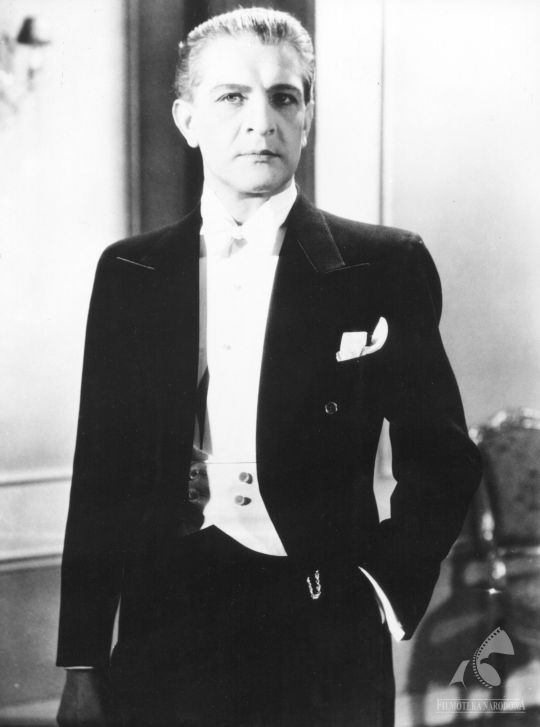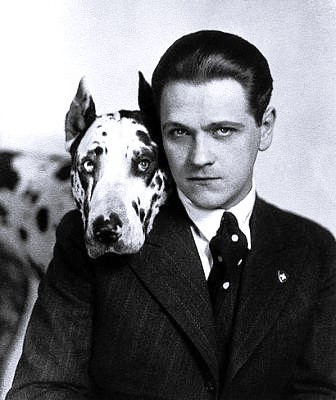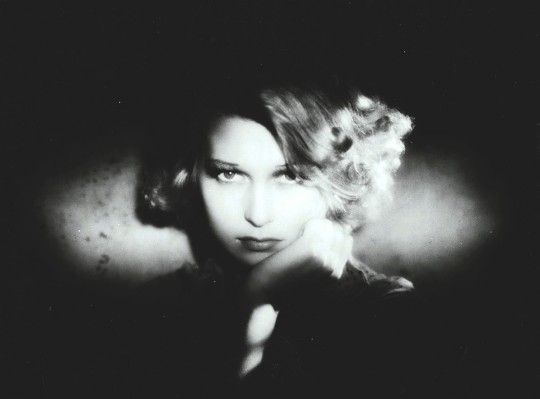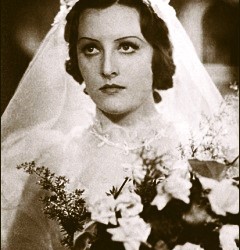Text

𝐌𝐚𝐫𝐢𝐚 𝐌𝐚𝐥𝐢𝐜𝐤𝐚 (May 9, 1900- September 30, 1992) from childhood it would seem that she was destined for an acting career. Her father was a technical worker at the Juliusz Słowacki Theater in Krakow, and Maria herself made her first appearance on stage when she was seven years old. She attended singing, dancing and rhythmic lessons. She was an acclaimed reciter. In her youth, she played the role of Marianne from Molière's drama "Skąpiec" ("The Miser"), Anna "Świt, dzień i noc" ("Dawn, day and night") by Niccodemi or the Bride "Wesele" ("Wedding") by Wyspiański. In 1935 she opened her own theater in Warsaw under her name. She married the actor Zbigniew Sawan, whom she wanted to rescue from Auschwitz during World War II. In order to save her ex-husband at the time, she collaborated with the Germans, having previously been prosecuted for performing in theaters that collaborated with the Germans. She was cleared of the charges for collaborating with the Germans, and received a performance ban penalty for her performances. She obediently served her punishment, although, as she usually said, she felt most comfortable in the theater. Over the course of her career, she appeared in films such as "Janko Muzykant" ("Janko the Musician") and "Uwiedzona" ("Seduced"), but she didn't take it seriously, but rather for financial reasons. She returned to the theater very quickly after serving her sentence, although some people were still distrustful of her. She remained active professionally until the end of her life.
#MariaMalicka#actress#40s#vintage#xxcentury#poland#polishactress#polskaaktorka#film#teatr#30s#polskiteatr
4 notes
·
View notes
Text

𝐅𝐫𝐚𝐧𝐜𝐢𝐬𝐳𝐞𝐤 𝐁𝐫𝐨𝐝𝐧𝐢𝐞𝐰𝐢𝐜𝐳 (November 29, 1892 - August 17, 1944) was born into a respectable family and there was no indication that he would become an amante and a dream of women in his later years. As a young man, he escaped from the army when Poland regained its independence in 1918, and he embarked on a theatrical career that he preferred to films, joining the touring company of actor Ludwik Dybizbański, who later became the director of the Municipal Theater in Bydgoszcz. Around this time he met Helena Thewsówna. The two fell deeply in love with each other. From their union a daughter was born, who wanted to perform on stage, and during her stay in the United States she took the name Ada Kennedy. Francis married Helena after some time, recognizing his daughter to take his name. Francis did not stop developing his career, performing alongside wily stars. He produced many great acting performances and appeared in films: "Dwie Joasie" ("Two Joans"), "U kresu drogi" ("At the End of the Road"), "Wrzos" ("Heather") and "Prokurator Alicja Horn" ("Prosecutor Alice Horn"). As his career progressed, interest in his private life increased. He kept his wife and daughter away from fame and often hid the fact of their existence. He often played roles of villains and bad guys, but was able to find his way in any role. He was described as a nice man, with beautiful eyes and hair, who is even more handsome than on screens or in photos. He also emphasized his love for his country, so during World War II he was very involved in helping soldiers and participating in the war by supplying weapons during the Warsaw Uprising. He died suddenly of a heart attack during one such assignment.
#franciszekbrodniewicz#30s#xxcentury#vintage#actor#poland#polish actor#aktor#amantpolskiegokina#amant#brodniewicz#polskiekino#kultura#film#teatr
3 notes
·
View notes
Text

𝐄𝐥ż𝐛𝐢𝐞𝐭𝐚 𝐁𝐚𝐫𝐬𝐳𝐜𝐳𝐞𝐰𝐬𝐤𝐚 (November 29, 1913 - October 14, 1987) was born from the union of a married man and an unmarried maiden. Her mother and Elizabeth herself were rejected by the family, considering it a disgrace on the family. After the outbreak of World War I and her father's departure, suddenly her mother's parents took them in and loved their granddaughter very much. From an early age she showed acting talents, by the way, her father's sister was also an actress, who supported her niece in developing her career. After graduating, Elżbieta began performing at the Polish Theater, with which she was associated almost until the end of her life. She made her debut there with the role of Helena from "Sen nocy letniej" ("A Midsummer Night's Dream") by William Shakespeare. In 1933 she met Marian Wyrzykowski, an actor and director who had a wife and daughter, at the theater. During this time, she starred in films such as "Pan Twardowski" ("Mr.Tvardovsky"), "Trędowata" ("Leprechaun"), "Znachor" ("Znachor"), "Nad Niemnem" ("On the Nemun River") and many more. After the outbreak of World War II, she separated from her beloved. During the war she was a waitress at the cafe "At the Actresses" and participated in underground theater life. Finally, in 1946, she married a divorced actor and bore him a son, who later also became an actor. Shortly thereafter, the actor Marian's ex-wife committed suicide, which Elżbieta later blamed on herself. However, she continued performing and having affairs, including with actors. The acclaimed actress unfortunately contracted Alzheimer's later in life. She was cared for by her son, as her husband died several years before her. In her lifetime, she was awarded medals of merit for theater and art. She left behind many great roles and appearances, and her acting has been described as timeless.
#elżbietabarszczewska#elizabethbarszczewska#actress#xxcentury#kinopolskie#polishcinema#poland#beauty#30s#fammefatale#40s#vintage#polishactress#polonia#cinema#cinematography#film#movie#polska#aktorka
3 notes
·
View notes
Text

𝐄𝐮𝐠𝐞𝐧𝐢𝐮𝐬𝐳 𝐁𝐨𝐝𝐨 (December 28, 1899 - October 7, 1943) was born as Bohdan Eugène Junod probably in Geneva, Warsaw or Łódź. His father was Swiss and his mother was Polish. After his father founded the Urania cinema-theater in 1907, he began performing on stage in Warsaw cabarets. His career took off quickly and he began appearing in films alongside the great movie stars of the time. He created his stage name from the first two letters of his middle name and two letters of his mother's name. His most famous role was created in the film "Piętro wyżej" ("Floor above"), where he sang his most famous song in his performance, "Umówiłem się z nią na dziewiątą" ("I made an appointment with her at nine o'clock"). His other famous performances include his role in the film "Czy Lucyna to dziewczyna?" ("Is Lucyna a girl?"), "Głos pustyni" ("Voice of the desert"), where he played the menacing Sheikh Abdullah, and "Czarna perła" ("Black pearl"), playing the role of a maritimer. In addition to his acting skills, he was able to charm women with his voice. He sang "Sex appeal" and "Już taki jestem zimny drań" ("I'm already such a cold-hearted bastard"), which became pre-war hits. He never married, although he had a great love for French actress of Tahitian descent Reri, whom he met on the set of "Black Pearl." The reason for the breakup was her fondness for liquor, as Bodo was a teetotaller. He lived with his beloved mother and dog Sambo (pictured above). In 1939, in Warsaw, he established his café, Cafe Bodo. During World War II, he went to Lviv, where he performed in a band called Tea-Jazz. In 1941 he tried to leave for the United States when Germany attacked the USSR. He was eventually arrested by the NKVD, the security body in Soviet Russia. They began to suspect him of espionage by having Swiss citizenship and knowledge of Russian and German, among other things. In the gulag, he began to suffer from depression. "The king of cinema" died of exhaustion and starvation. He was buried in a mass grave with other dead prisoners.
#eugeniuszbodo#polskiaktor#polish actor#vintage#xxcentury#30s#40s#singer#aktor#polskiekino#polishcinema#sohandsome#bodo#legenda
4 notes
·
View notes
Text

𝙄𝙣𝙖 𝘽𝙚𝙣𝙞𝙩𝙖 (March 1, 1912 - September 9, 1984) was born as Janina Florov-Bulhak in Kiev, Ukraine. Her date of birth or the fate of the actress is often shrouded in mystery, full of insinuations, so the birth date is probably not accurate. As the actress herself said, she was born a year later and in Georgia. It is certain that the first femme fatale of Polish cinema moved to Poland in 1920 during the Russian Civil War. She graduated from the Paris Sacré-Cœur School and the H. J. Hryniewiecki Vocal and Dramatic Courses in Warsaw. She made her debut on August 29, 1931 in the program Paradise Without Men, then in the Femina cabaret. In 1932, she made her debut in the film "Puszcza" ("The Forest") as a young heiress named Renia. She starred in such films as "Hanka,", "Jego ekscelencja subiekt" ("His Excellency, the Shop Assistant") and "Ludzie Wisły" ("People of the Vistula River"). During World War II she cooperated with the counter intelligence of the ZWK-AK. She contributed to the release of actor Franciszek Brodniewicz from the German Pawiak prison and actor Zbigniew Sawan from Auschwitz. With her partner Otto Haver, an Austrian, she was accused of Rassenschande "disgracing the race." In 1943, she hooked up with German dissident Hans Georg Pasch. They ended up in Pawiak together. There she gave birth to a son, Tadeusz (Thaddeus). On August 31, 1944, she was released from prison. For many years it was believed that she died during the Warsaw Uprising, which broke out on August 1, 1944. In fact, in Lower Saxony she married Hans, who was murdered not much after the wedding.
Ina traveled with her son to the Côte d'Azur, performing in the local pubs. There she met American Lloyd Fraser Scudder, whom she married in only 1954 through the man's divorce. In 1950 she bore him a son, John. They settled in Middletown, Pennsylvania. Her husband died in 1964 of lung cancer. He was the love of her life and after his death she did not want another man. She did not talk about her career in Poland or her wartime fate. Ina died in Mechanicsburg and was buried in Middletown Cemetery. Decades later, her grandchildren Greg and Alexandria Scudder flew to Poland and Germany to discover their grandmother's true fate.
#polishactress#inabenita#xxcentury#actress#aktorki#vintage#beauty#beautifulactress#blonde#fammefatale#polishfammefatale#poland#oldfilms
2 notes
·
View notes
Text

𝐒𝐭𝐚𝐧𝐢𝐬ł𝐚𝐰𝐚 𝐀𝐧𝐠𝐞𝐥-𝐄𝐧𝐠𝐞𝐥ó𝐰𝐧𝐚 (April 23, 1908 - August 7, 1958) was born in Warsaw as the daughter of a railroad worker. Since childhood, she wanted to become an actress, although in her youth she ran a small kindergarten. She later became a teacher, but this did not satisfy her ambitions. She enrolled in drama courses in 1932, and later became a cast member at the National Theater in Warsaw. She was not received kindly, but one of the prominent actors Ludwik Solski offered her a role in the play , "Dożywocie" ("The Annuity") for an ill actress on the day of the premiere. Her success contributed to her participation in films such as , "Florian" (1938), , "Rena" (1938), "Serce matki" ("Mother's Heart") (1938), "Wrzos" ("Heather") (1938), "O czym się nie mówi" ("What is Not Said About") (1939). In 1939 she married actor Eustachy Kojałłowicz, who supported her career. Theater was her greatest love. During World War II, she refused to play theater for the Germans. After the Warsaw Uprising, she found herself in a camp in Pruszkow. French soldiers pinned her photograph from the film, "Rena" above their bed. Later she acted in the Theater in Szczecin. During a dress rehearsal of ,"Genius and Madness," she collapsed on stage. She died at the age of fifty. She is still revered today for her great sense of humor, majestic beauty and great talent.
#stanisławaangel-engelówna#polskieaktorki#polishactress#xxcentury#acting#beauty#actress#kino#cinema#vintage#30s#40s#old polish#such beauty#oldpolishcinema
1 note
·
View note
Text
My first post
Hi, this is my first post on Tumblr even though I've been looking here for a long time. My fascination with the years my great-grandparents lived in has accumulated and I'm finally starting to write. Those who like cinema from those know such stars as Marilyn Monroe, Elizabeth Taylor and Clark Gable. I come from Poland and the native cinema also had its stars. I decided to insert posts with short biographies of Polish cinema stars. I hope you will find it interesting.
4 notes
·
View notes